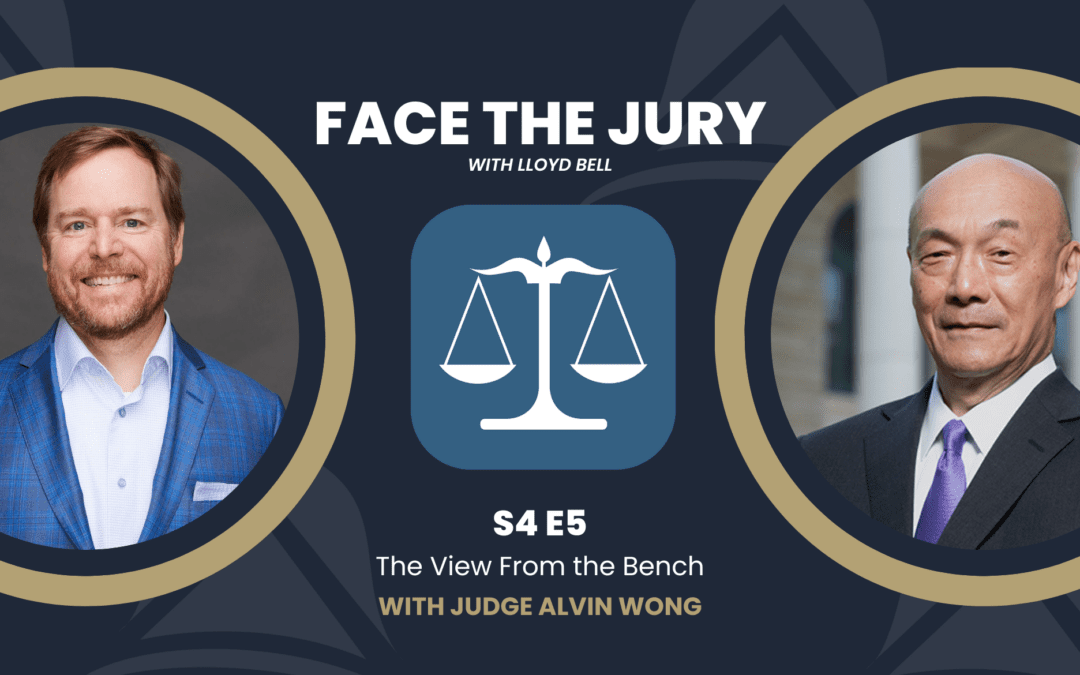In this episode of Face the Jury, we are joined by Judge Alvin Wong with the State Court of DeKalb County. He is a first-generation American who immigrated with his family from Hong Kong as a teenager. Judge Wong settled in Virginia, went to military school, and then attended Auburn University before making way to Atlanta. He attended law school at John Marshall Law School, then became a trial lawyer practicing a variety of courtroom law from criminal to civil cases for around 20 years before becoming Georgia’s first Asian-Pacific American judge in DeKalb County in 1998.
Judge Alvin Wong’s Mark
Judge Wong’s story is one of resilience and determination, starting with his immigration to the United States from Hong Kong as a teenager. His journey through military school, Auburn University and even his first job as an insurance underwriter led Wong to find a true passion in the legal profession. After passing the bar in 1976, Wong practiced independently for more than a decade and then as a law partner for another ten years, allowing him to run for the State Court of Dekalb County judge, where he is now in his seventh term unopposed.
From a trial lawyer’s perspective, Judge Wong is known for his tough yet fair approach. He’s earned a reputation for seeking practical solutions to disputes while maintaining the integrity of the legal process. His commitment to justice and amiable demeanor have made him a respected figure within the legal community.
Judge Wong has left an indelible mark on the legal landscape throughout his career. Not only has he been a trailblazer in his own right, but he’s also been deeply involved in community initiatives such as accountability courts and establishing alternative programs like a DUI court to help those struggling with addiction. Beyond his legal endeavors, Judge Wong is an animal lover and an active participant in nonprofit organizations such as the Lifeline Animal Project, a nonprofit that helps turn Atlanta animal shelters into no-kill shelters.
A Judge’s Perspective
As he reflects on his 26 years on the bench, Judge Wong has found the most shocking realization from viewing trials is how many times trial lawyers, both from the plaintiff and defense side, have a myopic view of the world. Judge Wong remarks on the tendency of lawyers to overlook weaknesses in their cases, which ultimately hurts them in court, lessening their chances of winning a favorable outcome.
Throughout his years of sitting on many civil cases, Judge Wong has connected a common theme: juries are smarter than people realize, and trial attorneys must trust in their discernment. He advocates leaving room for jurors’ imagination, suggesting that a well-presented case can allow them to connect the dots and reach informed conclusions without lawyers having to lay everything out there.
Political Divisions and Commonalities
Addressing the perception of political divisions infiltrating jury trials, Judge Wong highlights the role of personal experiences over political affiliations in influencing verdicts. He underscores the significance of understanding jurors’ perspectives and focusing on issues relevant to their lived experiences.
The Biggest Mistakes Lawyers Make
Lloyd addresses the question many lawyers are curious to know from a judge’s point of view: what is the biggest mistake lawyers make in court? Judge Wong explains that many times, lawyers forget there is an element in their case that they have yet to prove. It’s important to know the law and elements and then assemble your case. Off of Judge Wong’s point, Lloyd shares a key tip that the starting point for any new case is the jury charges. This advice is important, especially if lawyers aren’t too familiar with the charge or law associated with the trial.
Navigating Discovery Disputes and Misleading Tactics
Transitioning to procedural matters, Lloyd Bell raises concerns about obstructive behavior in discovery processes from opposing counsel. Judge Wong offers practical advice, emphasizing the importance of keeping discovery as simple as possible and communicating effectively between opposing counsels. Only use judicial intervention if necessary to streamline proceedings and ensure compliance but narrow the dispute for the court. Judge Wong finds face-to-face conversation the most effective way to settle disagreements at the end of the day.
Listen to Judge Wong’s episode here, and stay tuned for the next episode with our host, Lloyd Bell. Face the Jury is a podcast dedicated to confronting the issues involving medical malpractice in America– what it is, how to spot it and how to protect you and your family from medical negligence.

